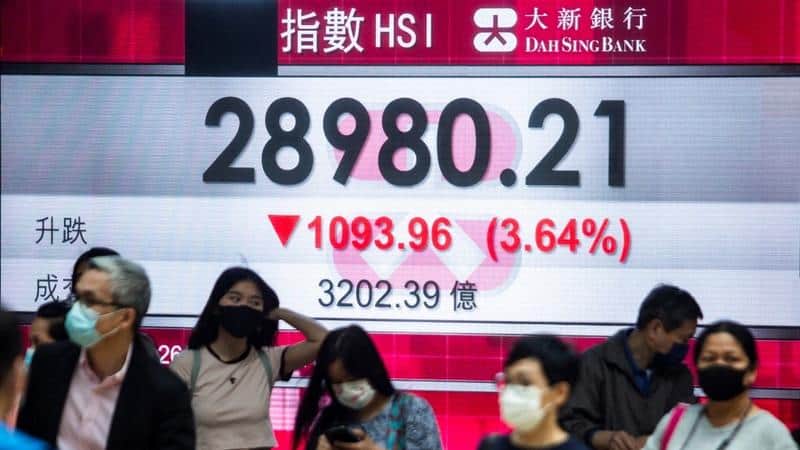SINGAPORE — Hong Kong’s Hang Seng index fell around 3% after news that China has imposed fines on heavyweights Tencent and Alibaba.
The benchmark index was down as much as 3.3% during the session, and closed 2.77% lower at 21,124.2, with the Hang Seng Tech index dropping 3.86%.
China imposed fines on several companies, including tech giants Alibaba and Tencent, for not complying with anti-monopoly rules on disclosure of transactions, according to Reuters. Hong-Kong listed shares of Alibaba and Tencent plunged 5.79% and 2.89% respectively.
Casino stocks in Hong Kong plunged following news that nearly all commercial and industrial businesses in Macao will shut for a week in a bid to stop the spread of Covid-19.
Shares of Wynn Macau in Hong Kong dropped 6.68%, Sands China fell 8.15% and Melco International Development slipped 7.13% at the close.
Mainland China markets traded lower. The Shanghai Composite shed 1.27% to 3,313.58, while the Shenzhen Component lost 1.87% to 12,617.23. The CSI 300 index, which tracks the largest mainland-listed stocks, declined 1.67% to 4,354.62.
Covid concerns are growing in China as Shanghai reportedly discovered a new omicron subvariant.
Chinese producer inflation rose 6.1% in June compared with the same period a year ago, official data released on Saturday showed. That was slightly above the expected rate of 6%, according to a Reuters poll, but slower than May’s print of 6.4%.
Consumer inflation increased 2.5% from a year earlier, also slightly higher than the 2.4% predicted in a Reuters poll.
Asia-Pacific markets
In other parts of the region, the Nikkei 225 in Japan rose as much as 2% and closed 1.11% up at 26,812.3, while the Topix index gained 1.44% to 1,914.66.
Japan’s ruling coalition is set to increase its majority in the upper house of the country’s parliament, local broadcaster NHK projected. Voters headed to the polls two days after former Prime Minister Shinzo Abe was assassinated while campaigning on behalf of the Liberal Democratic Party in the city of Nara.
Australia’s S&P/ASX 200 was down 1.14% at 6,602.2.
South Korea indexes see-sawed in morning trade, and the Kospi was closed down 0.44% to 2,340.27. The Kosdaq was above the flatline at 767.04.
MSCI’s broadest index of Asia-Pacific shares outside Japan was 1.81% lower.
In the U.S. on Friday, U.S. nonfarm payrolls for June surprised to the upside, coming in at 372,000, according to the Bureau of Labor Statistics. That’s well above the Dow Jones estimate of 250,000. The unemployment rate was unchanged from May at 3.6%.
That jobs report helped to reduce recession fears somewhat, economists said.
“There was no evidence in the jobs data that recession is imminent,” ANZ Research said in a Monday note.
“In our assessment, the biggest threat to a sustainable expansion remains inflation and the Fed will need restrictive rates to address that,” the note said.
Singapore and Malaysia markets are closed for a holiday on Monday.
Later this week, the U.S. will report inflation data, while China will release its GDP, industrial production and retail sales data. Earnings season also kicks off this week.
Currencies and oil
The U.S. dollar index, which tracks the greenback against a basket of its peers, was at 107.604.
The Japanese yen traded at 136.80 per dollar, weaker than levels seen late last week. The yen strengthened on news that former Prime Minister Shinzo Abe had been shot Friday. The Australian dollar changed hands at $0.6808.
U.S. crude futures were dropped 2.28% to $102.40 per barrel in Asia’s morning trade, while Brent crude slipped 2.1% to $104.77 per barrel.

